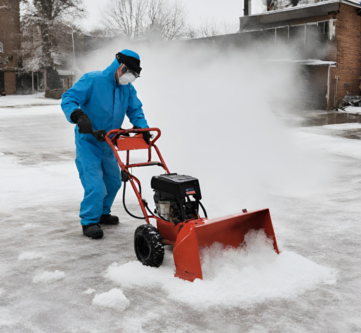How to protect your physical and mental health this season
Gone are the days when British Columbians could boast about mild winters to our friends on the East Coast. As we’ve seen over the past couple of years, the effects of climate change have not only brought lower temperatures but also increased snowfall, freezing rain, and a whole slew of winter weather conditions that many of us are not accustomed to. As we adapt to the conditions of the new normal, workers and employers must take proactive steps to protect themselves against the increased risks associated with winter.
Watch for winter hazards
Falling snow may be a picturesque backdrop, but inclement weather can pose significant risks when it comes to workplace health and safety. Icy sidewalks, slick road conditions, and falling snow are just a few winter-weather conditions crews need to consider when looking at ways to protect workers from weather-related hazards.
When workplace conditions change, including changes to the weather, employers should revisit their worksite risk assessments. Work with your crew to determine if any new hazards may be present in and around their workplace due to winter conditions. According to WorkSafeBC, cold stress, motor vehicle incidents, and slips, trips, and falls are common risks employers should anticipate during the winter season. Implementing appropriate controls and being proactive can help prevent injuries. Here are some ways to do this:
- Choose locations that provide less risk of exposure to cold-weather elements or slippery conditions.
- Provide warming shelters for workers on site.
- Ensure anyone who is required to drive during their work has proper training and winter tires.
- Post signs warning of particularly slippery areas.
- Clear snow and apply salt to high-traffic walkways and areas.
- Remind workers to dress appropriately for winter conditions.
- Provide warm beverages and heat packs for gloves and shoes when possible.

Working in cold-weather conditions can lead to serious injuries if you and your team aren’t prepared. Monitor weather forecasts regularly throughout the season and be ready to put additional safety measures in place where needed to keep workers safe. For more information, see Actsafe bulletin #34, Preventing Cold-Related Illness.
Battling the winter blues
The increase in extreme weather events such as flooding and snowstorms can also bring about some uneasy feelings when it comes to facing the reality of climate change. Add longer and darker days with gloomy skies, and many individuals can find themselves struggling with their mental health during this time of year.
Recent studies have shown that an increasing number of Canadians are having difficulty staying hopeful about our uncertain and changing future. Whether they’ve been directly impacted by an extreme weather event or have general distress about what the future of our planet holds, these complex emotions can sometimes prevent individuals from going about their daily lives. It can be common for people to experience a range of emotions in response to climate change—feelings of anxiety, grief, fear, stress, and depression are examples of how this can manifest and can vary in intensity. Seasonal depression is also very common as we experience fewer hours of daylight during the winter months.

As an employer, supporting the health and safety of your workers, including their mental health, is a legal requirement. Keep an eye out for significant changes in mood or behaviour among your crew and performers. If you think someone may be struggling, create opportunities to check in with them regularly. Encouraging open and supportive communication can help reduce the stigma around mental health challenges and foster a supportive workplace culture. If you’re able to identify mental health issues in your workers, you can be in a better position to support them in getting the help they need.
Here are some other ways you can help support the mental wellness of your team members during the winter months:
Connect to resources
There are many resources available to those struggling with mental health:
- Crisis Centre of BC: crisiscentre.bc.ca or 1.800.SUICIDE (1.800.784.2433)
- 310 Mental Health Support: crisislines.bc.ca or 310.6789 (no need to dial area code)
- Centre of Expertise on Mental Health in the Workplace Government of Canada
- HeretoHelp: heretohelp.bc.ca
- Anxiety Canada: anxietycanada.com
- MoodFX: moodfx.ca
- Calltime Mental Health: calltimementalhealth.com






